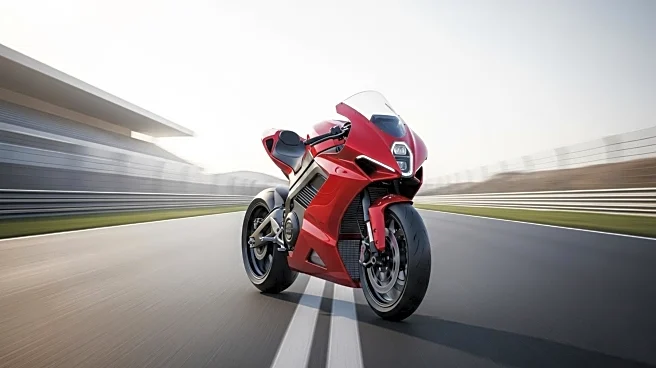What's Happening?
The 2025 FIM MotoE World Championship has showcased Ducati's V21L prototype as a groundbreaking force in electric racing. Throughout the season, the V21L has demonstrated exceptional performance, challenging traditional combustion engine racing with its advanced engineering. The penultimate round at Misano was marked by intense competition, with Alessandro Zaccone seizing the championship lead after a dramatic race. Despite the technological advancements and competitive racing, the series is set to face an indefinite hiatus due to insufficient fan engagement and slower market growth.
Why It's Important?
The success of Ducati's V21L in the MotoE World Championship highlights the potential of electric vehicles in motorsport, offering a glimpse into the future of racing and transportation. The advancements in battery technology and engineering have allowed electric motorcycles to compete at levels previously dominated by combustion engines. This shift could influence broader adoption of electric vehicles, impacting industries related to automotive manufacturing, energy, and environmental policy. However, the series' hiatus underscores challenges in market acceptance and fan engagement, which are crucial for the sustainability of electric racing.
What's Next?
The final race of the season will take place at the Portuguese Grand Prix in November, where the championship will be decided. Following this, the series will pause indefinitely, leaving the future of electric racing uncertain. Stakeholders in the motorsport industry may need to reassess strategies to increase fan engagement and market growth to ensure the continuation of electric racing. The technological advancements achieved by Ducati could influence future developments in electric vehicle design and performance, potentially reshaping transportation and racing.
Beyond the Headlines
The indefinite hiatus of the MotoE series raises questions about the cultural and economic factors affecting the adoption of electric racing. Despite technological maturity, the series struggles with fan engagement, highlighting a gap between innovation and consumer interest. This situation may prompt discussions on how to better market electric racing and integrate it into mainstream motorsport culture. Additionally, the advancements in battery technology could have long-term implications for electric vehicle development beyond racing, potentially accelerating the transition to sustainable transportation solutions.








